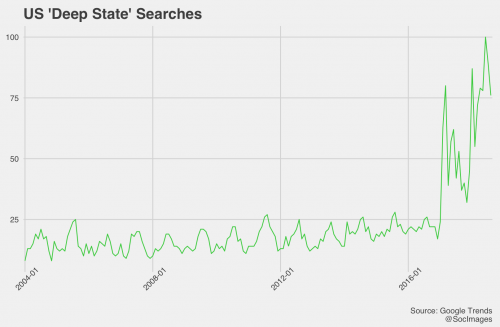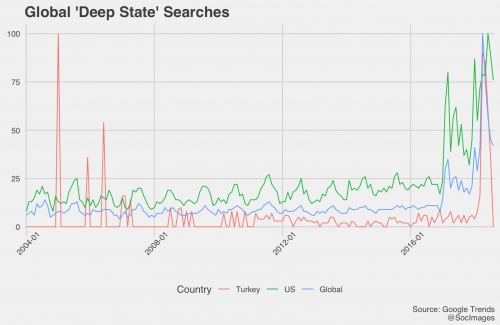This week a host of digital platforms gave Alex Jones’ programming the boot. Conspiracy theories have big consequences in a polarized political world, because they can amplify basic human skepticism about political institutions into absurd, and sometimes violent, belief systems.
But the language of mainstream politics can often work the same way when leaders use short, pithy phrases to signal all kinds of beliefs. From “mistakes were made” to the “food stamp president” slur, careful choices about framing can cover up an issue or conjure up stereotypes to swing voters.
In the past two years, you may have noticed a new term entering the American political lexicon: the “deep state.” Used to refer to insider groups of political specialists (especially in government agencies like the FBI or in the media), “deep state” conjures up images of a shadowy network of political power brokers who operate outside of elected office. The term has really caught on—search data from Google Trends shows a huge spike in “deep state” searches since 2016.

Deep state talk catches my interest because I have heard it before. For years now, politicians in Turkey have raised allegations about secretive “deep state” organizations plotting to overthrow the government. While Turkey has had coups in the past, these kinds of accusations are also one way that leadership has been able to justify cracking down on political opposition. Sure enough, trends also show deep state searches spiked in Turkey about ten years before the US (I also added the global trend for context).

This data doesn’t show a direct connection between the Turkish and American cases. It does show us that new political ideas don’t necessarily spring out from nowhere. For example, work by sociologists like Chris Bail shows how ideas from the fringes of the political world can make their way into the mainstream, especially if they rely on emotionally-charged messaging. As political consulting and strategy goes global, it is important to pay attention to how these ideas play out in other times and places when we see them emerging in the United States.
Evan Stewart is an assistant professor of sociology at University of Massachusetts Boston. You can follow his work at his website, or on BlueSky.
Comments 7
James Haul — March 4, 2021
A meek politician can’t survive in American politics because opponents will not let him win even a single seat in general elections. I would say that a meek person should keep himself away from politics because he can’t handle the situation very well like an intelligent and sharp-minded person. Well, I also read an article published here about how to get financial translation service online at cheap rates.
Laura — November 8, 2023
Mapquest Directions does more than just show you directions. People can also look for places close by, like hotels, restaurants, shops, gas stops, and more. Aside from that, users can see the world with 3D maps, satellite and street views, and live traffic and transit reports. The mapquest directions can help people get where they need to go faster and easier, whether they need to drive, walk, or take the bus.
Kevin Martin — January 23, 2024
Deep state research has been a popular trend in recent times, as more and more people are interested in uncovering the supposed secrets and hidden agendas of powerful government organizations.
Water Heater Installation Experts in Surprise AZ
David Noel — March 19, 2024
Selecting the ideal CRM for your business involves assessing your specific needs, considering scalability, customization options, and integration capabilities. Evaluate user-friendliness, customer support, and cost-effectiveness. Choose a CRM that aligns with your business goals and provides the necessary tools to streamline processes, enhance customer relationships, and drive growth.
David Miller — April 23, 2025
Discover the future of convenience with J&A Shoppin! We specialize in bringing you the best smart tech for home, offering a curated selection of smart home gadgets that are both innovative and easy to use. Whether you're into cool smart home tech, looking to upgrade your space with affordable smart home tech, or want the best smart home tech UK shoppers love—J&A Shoppin has it all.
Ecomfly — June 25, 2025
That post was a fascinating dive into how search trends reflect public curiosity and cultural shifts. Just like those evolving interests, Shopify Automation Services help businesses adapt in real time—responding to customer behavior, streamlining operations, and staying ahead of the curve. Whether it’s decoding online patterns or optimizing e-commerce, smart tools make all the difference.
Aaron Kearney — July 2, 2025
Broadcasting regional updates and feel-good music, Kearney FM brings a true sense of community to the airwaves. It's radio that resonates with real lives.